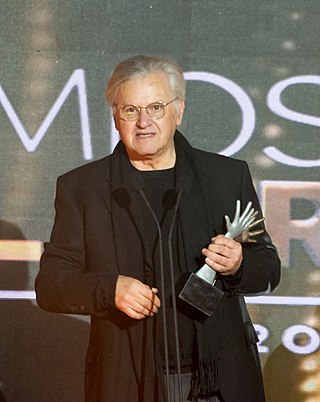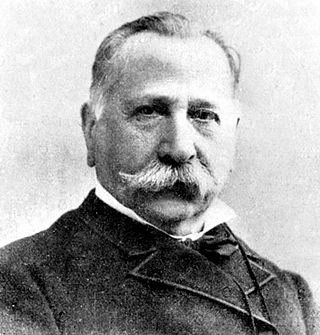Members
It had over 40 members, including the following: [2]
 |
The Literary Society of 1842 (Spanish : Sociedad Literaria de 1842) was a group of prominent Chileans from the social, political, and literary fields. Its goals were promoting originality among the nation's writers, strengthening the social quality of literature, and rejecting foreign literary models. [1] The group held 86 meetings from 5 March 1842 to 1 August 1843. [2]
It had over 40 members, including the following: [2]
 |

Andrés de Jesús María y José Bello López was a Venezuelan-Chilean humanist, diplomat, poet, legislator, philosopher, educator and philologist, whose political and literary works constitute an important part of Spanish American culture. Bello is featured on the old 2,000 Venezuelan bolívar and the 20,000 Chilean peso notes.

Eduardo Guillermo Carrasco Pirard is a Chilean musician, university professor of philosophy, author, and one of the founders of the Chilean folk music group Quilapayún - and the group's musical director from 1969 to 1989.
Francisco Ibáñez de Segovia y Peralta (1644–1712) was a Spanish colonial administrator who was Royal Governor of Chile from 1700 to 1709. He was born in Madrid and died in Lima.
Juan Andrés de Ustariz de Vertizberea was a Royal Governor of Chile during the early 18th century.
The Academia Chilena de la Lengua is an association of academics and experts on the use of the Spanish language in Chile. It is a member of the Association of Academies of the Spanish Language and is a part of the Instituto de Chile.

Friar José Camilo Henríquez González was a priest, author, politician, and is considered an intellectual antecedent to and founding father of the Republic of Chile for his passionate leadership and influential writings. He was also one of the most important early South American newspaper writers and wrote several essays, most notably the Proclama de Quirino Lemachez, which promoted Chilean independence and liberty. He also wrote under the pseudonym Quirino Lemachez.
Miguel Ángel Garrido Gallardo is a Spanish philologist and semiotician. Born September 7, 1945, in Lubrín, Almería, Spain. He is the adopted son of the town of Los Santos de Maimona. He is a professor of research at the Consejo Superior de Investigaciones Cientificas (CSIC) [National Council for Scientific Research] in Madrid and distinguished university professor.

Chilean literature refers to all written or literary work produced in Chile or by Chilean writers. The literature of Chile is usually written in Spanish. Chile has a rich literary tradition and has been home to two Nobel prize winners, the poets Gabriela Mistral and Pablo Neruda. It has also seen three winners of the Miguel de Cervantes Prize, considered one of the most important Spanish language literature prizes: the novelist, journalist and diplomat Jorge Edwards (1998), and the poets Gonzalo Rojas (2003) and Nicanor Parra (2011).
Sady Zañartu was a Chilean writer who created foundational works in the genres of Criollismo, historical anecdote, and patriotic valorization of the nation. He won the Chilean National Prize for Literature in 1974.
Recaredo Santos Tornero Olmos was a Chilean editor, journalist and director of El Mercurio de Valparaíso and founder of El Comercio.

The Revolution of 1851 was an attempt by Chilean liberals to overthrow the conservative government of president Manuel Montt and repeal the Chilean Constitution of 1833. After various battles and sieges, by late December 1851 government forces had subdued the revolutionaries.
The Grand Lodge of Chile is a regular Masonic body in Chile founded on May 24, 1862. The earthquake of 1906 destroyed the original headquarters and the archives of the Grand Lodge, which determined its definitive transfer to Santiago, settling in the Club de la República.
Pedro Nolasco Cruz Vergara was a Chilean literary critic, novelist, writer, and politician.

Eusebio Lillo Robles was a poet, journalist and politician. He is the author of the lyrics of the Chilean National Anthem.

Jaime Eyzaguirre was a Chilean lawyer, essayist and historian. He is variously recognized as a writer of Spanish traditionalist or conservative historiography in his country.

José Victorino Lastarria was a Chilean writer, legislative deputy, senator, diplomat, and finance minister.

Rosario Orrego Castañeda, also known as Rosario Orrego de Uribe, Rosario Orrego de Chacón, and by her pseudonym Una Madre, was a Chilean novelist, poet, editor, and educator. She is considered Chile's first woman novelist, a pioneer in the poetic field in that country, and one of the forerunners of women's literature in Hispanic America.

Gloria Dünkler is a Chilean writer, and winner of the 2016 Pablo Neruda Award. She is best known for her poetry, although she also collects folktales.
María Flora Yáñez Bianchi was a Chilean writer who worked in the novel and short story genres, for which she received the University of Concepción's Atenea Award in 1947 and the Santiago Municipal Literature Award in 1952.

María José Ferrada is a journalist and writer from Chile. She has written numerous books for children and young adults in the Spanish language, and her work has been widely translated. She has received multiple awards for her work, including the Premio Academia of the Academia Chilena de la Lengua, and the Literary Prize of the City of Santiago, and her books for children have been published in several countries, including Spain, Argentina, Colombia, Brazil, Mexico, Italy and the United States, in addition to Chile. She is currently the editor of Chile para Niños, which is the National Library of Chile's digital resource center for children.